Table of Contents
What is a Determiner?
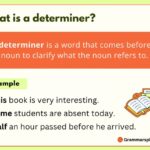
A determiner is a word placed before a noun to provide more information about it, such as whether it is specific, general, known, or unknown.
Examples
The car is parked outside.
A cat is sitting on the wall.
Can you give me some water?
This book is very interesting.
There are few people in the hall.
How to Use determiners in sentences?
Determiners are words placed before nouns to clarify or specify their meaning. They tell us whether a noun is definite or indefinite, how many there are, or to whom they belong. Determiners ensure that the noun is understood in the correct context.
Determiners Used in Sentences
Articles: The, a, and an specify whether a noun is definite or indefinite.
- I saw a dog in the park.
- The book on the table is mine.
Demonstratives: This, that, these, and those point to specific nouns.
- This car is very expensive.
- I prefer those shoes over these.
Possessives: My, your, his, her, its, our, and their show ownership or belonging.
- Her idea was brilliant.
- We found our seats in the hall.
Quantifiers: Words like some, any, many, few, all, both, and several indicate quantity.
- She has many friends.
- Do you need any help with your homework?
Numbers: Cardinal numbers like one, two, and three specify an exact quantity.
- He bought two apples.
- Only one student submitted the assignment on time.
Distributives: Words like each, every, either, and neither refer to members of a group individually or collectively.
- Each student received a certificate.
- Neither option is suitable.
Types of Determiners
Determiners are words placed before nouns to clarify or specify them. They help define whether the noun refers to something specific or general. Here are the main types of determiners explained simply:
1. Articles
Articles are used to indicate whether a noun is specific or general.
Definite Article:
The word the is used when referring to something specific.
- The car is parked outside.
Indefinite Articles:
The words a and an refer to something general or non-specific.
- A dog is barking loudly.
2. Demonstratives
Demonstratives point to specific things or people. The main demonstratives are this, that, these, and those.
- This book is very interesting.
- Those apples are fresh.
3. Possessives
Possessive determiners show ownership or possession. Common possessive determiners include my, your, his, her, its, our, and their.
- My friend lives nearby.
- Their house is very big.
4. Quantifiers
Quantifiers show how much or how many of something there are. They include words like some, many, few, several, and all.
- Many students are attending the event.
- Few people know this secret.
5. Numbers
Numbers as determiners indicate exact amounts or positions.
- Three birds were sitting on the tree.
- The first chapter of the book is amazing.
6. Interrogatives
Interrogative determiners are used to ask questions about nouns. The most common ones are what, which, and whose.
- What color do you prefer?
- Whose bag is this?
7. Distributives
Distributive determiners refer to members of a group individually rather than collectively. Common examples are each, every, either, and neither.
- Each student must submit the form.
- Neither option seems suitable.
8. Exclamative
Exclamative determiners express strong feelings or emotions. The most common one is what.
- What an amazing view!
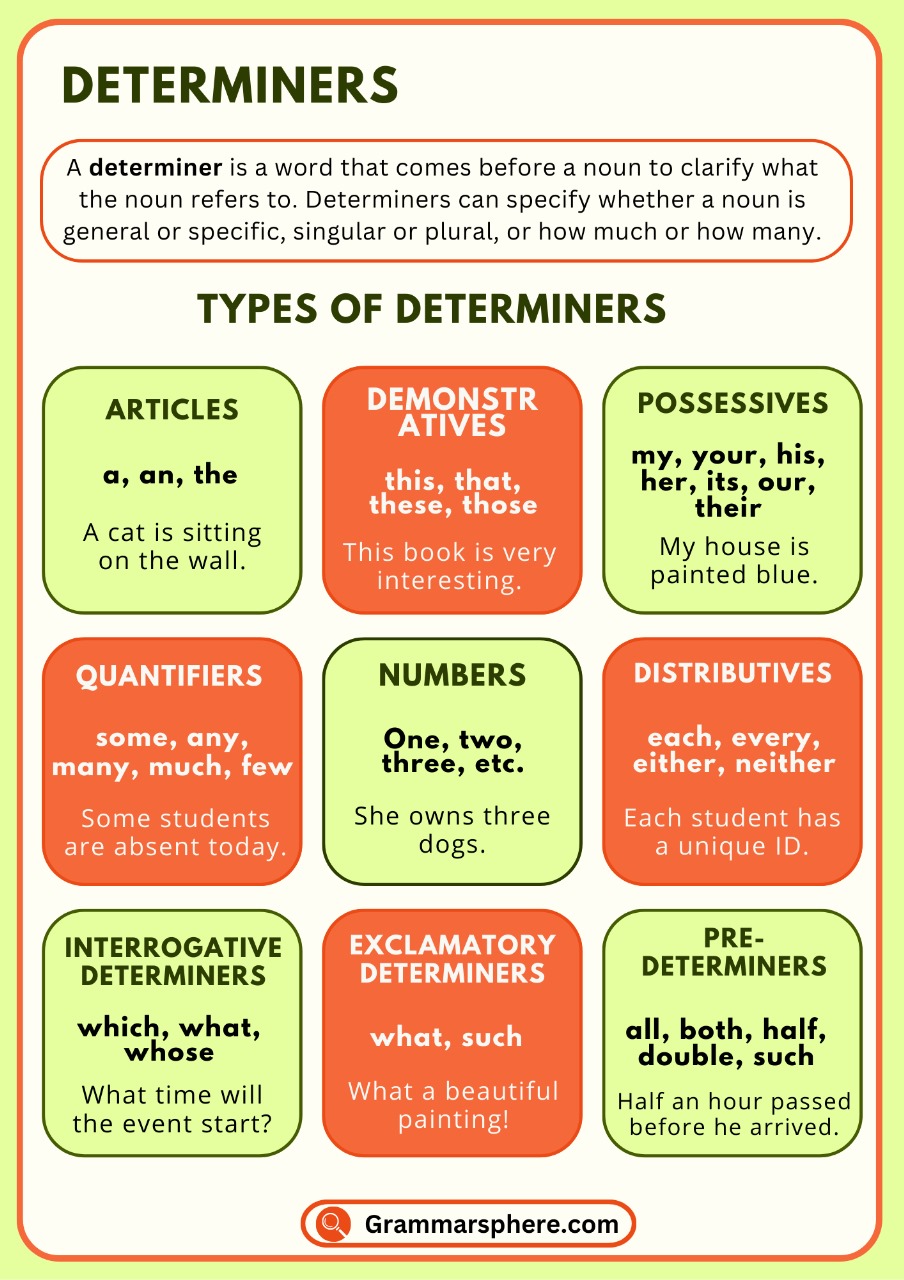
Rules of Determiners
1. Determiners Must Agree with the Noun
A determiner should match the noun in terms of number or definiteness.
- Use singular determiners like a or an with singular countable nouns.
–A cat is sitting on the roof.
- Use plural determiners like some or many with plural nouns.
Many students joined the class.
2. Articles Depend on Specificity
- Use the definite article the when referring to something specific.
–The book you gave me is interesting.
- Use indefinite articles a or an for general or non-specific nouns.
–An apple a day keeps the doctor away.
3. Demonstratives Indicate Proximity
Use this and these for things near you, and that and those for things farther away.
–This chair is comfortable.
–Those stars look beautiful.
4. Possessives Show Ownership
Possessive determiners like my, your, and their are used to show possession.
–Her idea was brilliant.
–Our team won the match.
5. Quantifiers Depend on Countability
Quantifiers like much are used with uncountable nouns, while many is used with countable nouns.
–Much water was wasted.
–Many books are on the shelf
Determiners vs. Descriptive adjectives
Determiners and descriptive adjectives both come before nouns, but their roles are different. Determiners clarify the reference or quantity of the noun, while descriptive adjectives provide more information about the noun’s qualities or characteristics.
1. Role of Determiners
Determiners help specify the noun or indicate how much or which one it is. They include words like the, a, my, some, and every.
- My car is parked outside.
- Every student must participate.
2. Role of Descriptive Adjectives
Descriptive adjectives describe the qualities, appearance, or nature of a noun. They include words like beautiful, tall, red, and happy.
- She has a beautiful dress.
- They live in a tall building.
3. Key Difference
- Determiners are necessary for defining the noun’s scope or reference.
- Descriptive adjectives are optional and provide additional information.
Example: The red apple is on the table.
Here, the is the determiner that specifies the apple, while red is the descriptive adjective that tells about its color.
4. Position in a Sentence
Determiners always come before descriptive adjectives when both are used.
Example: My old house was near the park.
In this sentence, my is the determiner, and old is the descriptive adjective.
Examples of Determiners
- The teacher explained the topic clearly.
- A dog is barking loudly outside.
- This book is very interesting.
- Some students missed the class today.
- Her dress looks elegant.
- Every child in the room was smiling.
- Those apples are fresh and juicy.
- Five people attended the meeting.
- Which color do you prefer for the walls?
FAQS about Determiners
What is a determiner and examples?
A determiner is a word that comes before a noun to specify or clarify its meaning.
Examples of determiners:
Articles: a, an, the (e.g., A cat is on the table.)
Possessives: my, your, his, her (e.g., Her book is on the shelf.)
Demonstratives: this, that, these, those (e.g., This car is new.)
Quantifiers: some, many, few, all (e.g., Many people attended.)
What are 7 types of determiners?
Articles: a, an, the
Demonstratives: this, that, these, those
Possessives: my, your, his, her, its, our, their
Quantifiers: some, any, many, few, much, several, all
Numbers: one, two, three, etc.
Interrogatives: which, what, whose
Distributives: each, every, either, neither
How do you identify determiners?
Determiners are words that come before a noun to provide context like quantity, possession, or specificity. Examples include:
Articles: a, an, the
Demonstratives: this, that, these, those
Possessives: my, your, their
Quantifiers: some, many, all
Numbers: one, two, three
What is the difference between determiners and articles?
Determiners are words that modify nouns to clarify their meaning (e.g., this, some, every). Articles are a specific type of determiner that indicate whether a noun is specific (the) or general (a, an).
You May Also Like

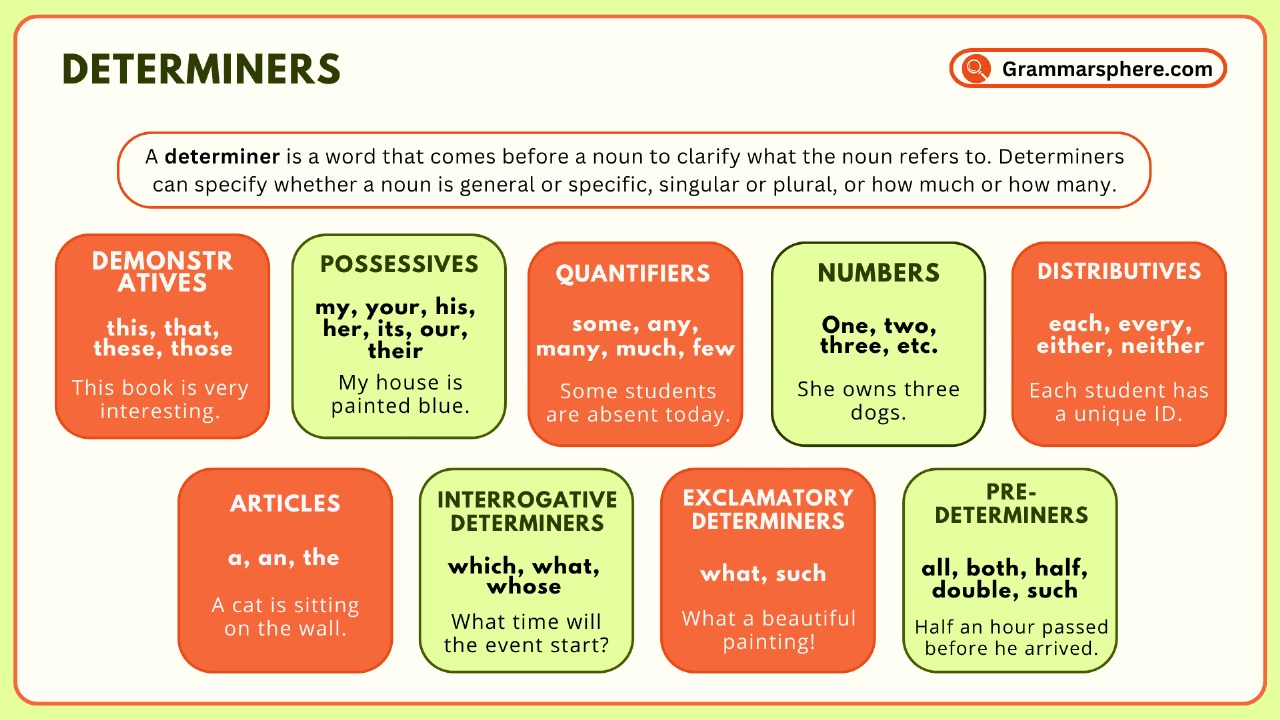
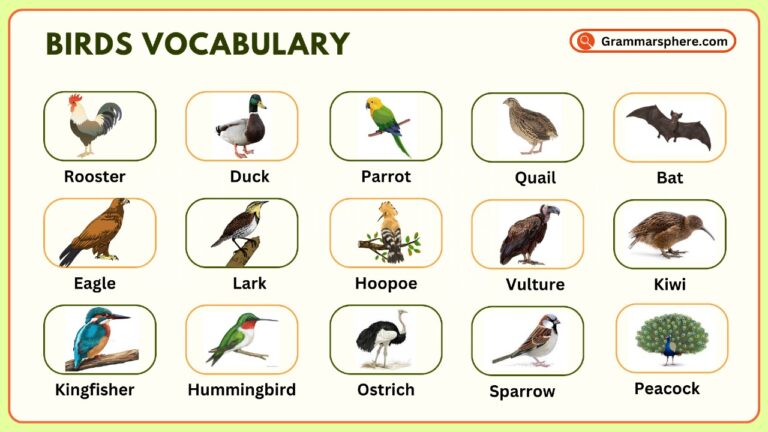
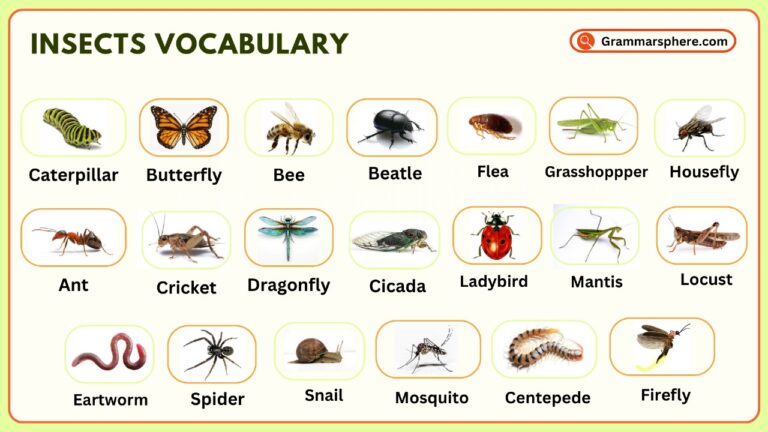
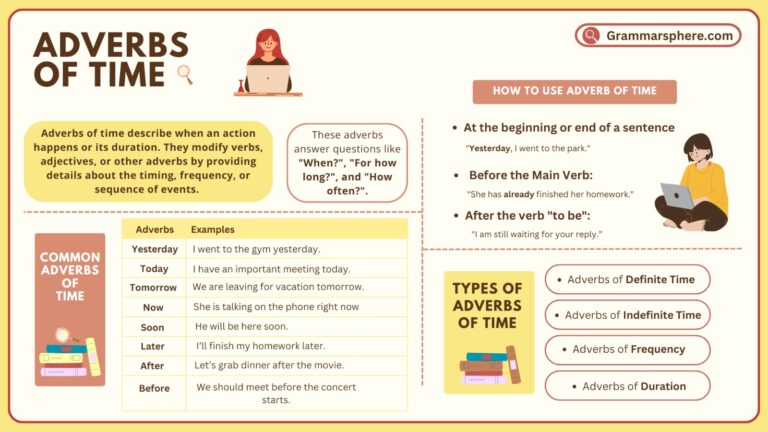
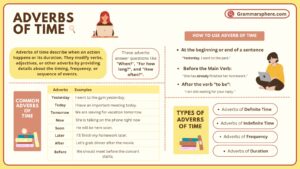
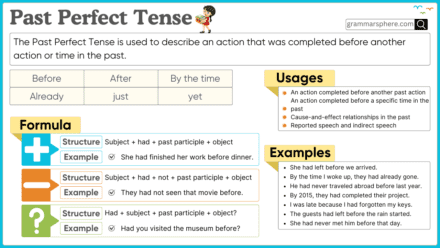
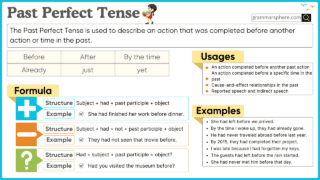
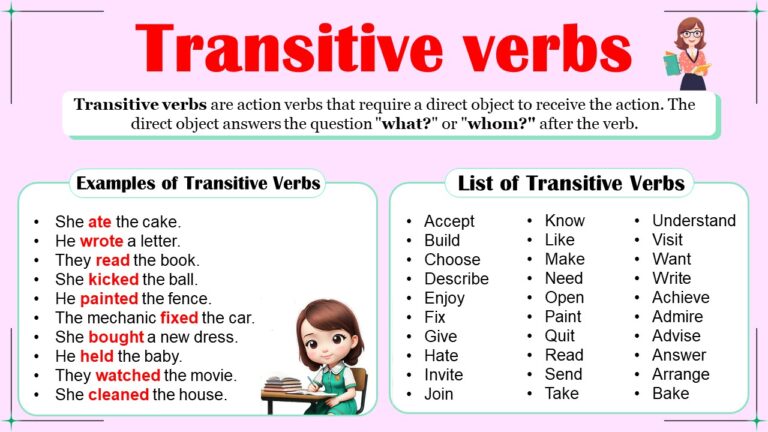
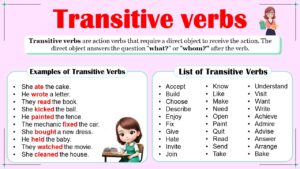
Leave a Comment